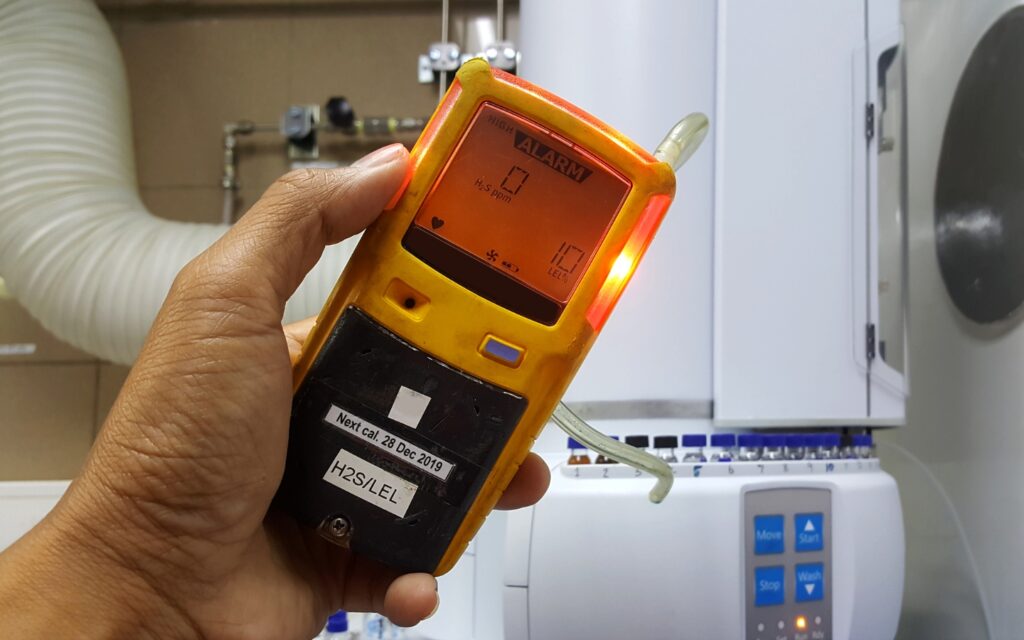Sewer gas exposure is extremely deadly when inhaled in high concentrations.Potential side affects include, headaches, nausea, vertigo, and in some cases even death. The most likely places to encounter a sewer gas leak in your home is the basment or in any enclosed crawl spaces.
If you reside in a home with a septic tank, you are also in danger of being exposed to sewer gas.
Health Risks Associated with Sewer Gas Exposure
Sewage gas is made up of a combination of Methane, hydrogen sulfide and carbon dioxide. Mathane can cause asphyxiation and while gaseous hydrogen sulfide is unlikely to cause asphyxiation, it is both colourless making it hard to detect and is also pottentially highly conbustable.
People also rarely show signs from sewage gas poisoning hours or even days after being exposed because symptoms wont develop until hydrogen sulfide has already caused damage to the victims neurological system.
The short-term symptoms of sewer gas inhalation can include:
- Eye irritation
- Coughing
- Wheezing
- Nausea
- Vomiting
- Migraine
- Drowsiness
- Loss of consciousness
People with asthma and Chronic Obstructive Pulmonary Disease (COPD) are more vulnerable to sewer gas exposure. Prolonged exposure to sewer gas can lead to:
- Cancer
- Asthma
- Loss of Memory
- Cognitive Decline
Factors Affecting Sewer Gas Entry

The factors affecting sewer gas entry into a home can be divided into three main categories: plumbing design and condition, external factors, and ventilation systems.
Improper plumbing design or poor maintenance can create leaks or cracks that allow sewer gas to seep into the home.
External factors like flooding or heavy rains can also force sewer gas into a home. Ventilation systems are necessary to stop sewage gas from building up within a house. Gas can build up and present a health risk if the ventilation system is not functioning properly.
Diagnosing Sewer Gas Poisoning
To aid in detecting any sewer gas leaks you can use a sewer gas detector to find the source of any potential leaks. If you cannot find the source of the gas it is advised to call a professional to help with the detection of any pottential leak.
If you choose to self check then listen for hissing or gurgling noises coming from pipes or drains, feel around for warm or cool spots around pipes or drains. It’s crucial to call an expert right away and to leave your home if you think there might be sewer gas present.
Preventing Sewer Gas Intrusion

Pipe, drain, and vent cracks are all potential entry points for sewer gas inside your home. Sewer gas poisoning is more likely in homes with older plumbing systems.
You can use caulk or weatherstripping to seal these openings. To prevent sewer gas intrusion, it is essential to:
- Have your plumbing system regularly maintained by a professional plumber.
- Properly install plumbing traps and vents.
- Seal all entry points for gas, such as cracks in pipes and drains.
- Install a sewer gas detector in your home.
- Make sure that your home has a working sewer gas detector.
How to Avoid Sleeping in Sewer Gas?

To avoid sleeping in sewer gas contamination, make sure your home is well-ventilated. Open windows and doors, and run fans to circulate the air.
Do not sleep in a room with a gas leak. You can also install a sewer gas detector in your bedroom to alert you to the presence of gas. To prevent sleeping near a sewage leak you can;
- Check for gas leaks regularly.
- Have your septic tank pumped regularly.
- Inspect your sewer lines for cracks or leaks.
- Keep your drains clean and free of clogs.
- Do not light a match or turn on any electrical appliances if you smell gas.
- Evacuate the premises immediately and call a plumber.
Emergency Response and Treatment
If you suspect that you or anyone else is suffering from sewer gas exposer it is crucial to act immediatly, leave the pottential contaminated area, get fresh air as soon as possible and seek medical help.
If you have mild symptoms do not wait to see if the symptoms develop further, try to obtain oxygen treatment if you can as improved breathing and a lower risk of complications are the outcomes of oxygen therapy.
As there is no cure for sewer gas poisoning getting assistance services as fast as possible will result in a greater chance of reduced long term side effects. Fluids, medicines, and complication monitoring are all apart of this.
However, therapy can lessen symptoms and limit additional harm. Even if you are symptom-free after being exposed to sewer gas, it is crucial to get medical help.
Safety Measures for Homes and Businesses

To prevent sewer gas issues in your home, you should follow these tips.
Install a sewer gas detector in your basement, crawl space, and other spaces where sewer gas can gather. It is meant to notify you concerning the presence of gas so that you can take the necessary precautions.
Inspect your plumbing system regularly for leaks and clogs. Keep your sump pump in good working order and vent your septic tank properly.
To prevent sewer gas issues in your business place, remember to have your plumbing system regularly inspected by a professional.
Install sewer gas detectors in all areas where employees and customers may be exposed to sewer gas.
Wear safety gear, such as a respirator, if you work where sewer gas exposure is possible. Train employees on how to identify and respond to sewer gas leaks.
Final Words
Health problems from sewer gas can be lethal. Sewer gas exposure can be dangerous. Therefore, it’s crucial to be aware of the risks and take precautions.
Plumbing inspections and codes of conduct should be enforced by the authorities. Public education about how to protect themselves from exposure should be done by experts. We need to collaborate to reduce methane gas poisoning.
FAQs
Can sewer gas exposure be fatal?
Yes, particularly in high amounts, exposure to sewer gas can be lethal. Sewer gas’s primary constituent, hydrogen sulfide, can result in health issues, even death.
Are There Any Long-Term Health Effects From Mild Sewer Gas Exposure?
Mild sewer gas exposure may not cause any immediate health problems, but it can still have long-term effects. The neurological system, lungs, and kidneys can suffer harm by exposure to low concentrations of methane gas. Additionally, it might make cancer more likely.
Is Sewer Gas Exposure More Common In Certain Weather Conditions?
Yes, Sewer gas exposure is more common during hot, humid weather, as the gas can evaporate more easily in these conditions.








